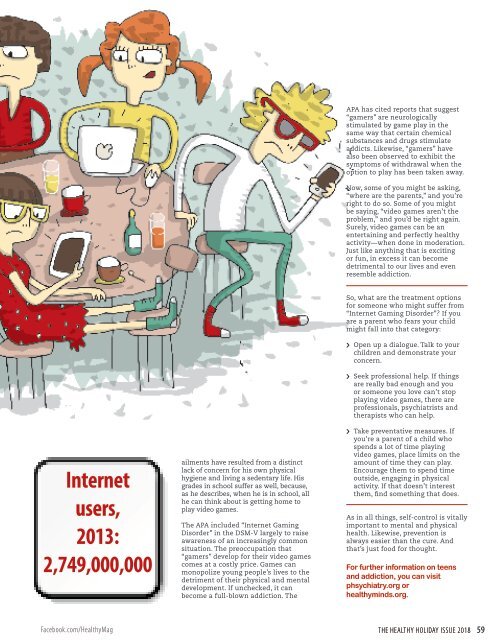Create successful ePaper yourself
Turn your PDF publications into a flip-book with our unique Google optimized e-Paper software.
APA has cited reports that suggest<br />
“gamers” are neurologically<br />
stimulated by game play in the<br />
same way that certain chemical<br />
substances and drugs stimulate<br />
addicts. Likewise, “gamers” have<br />
also been observed to exhibit the<br />
symptoms of withdrawal when the<br />
option to play has been taken away.<br />
Now, some of you might be asking,<br />
“where are the parents,” and you’re<br />
right to do so. Some of you might<br />
be saying, “video games aren’t the<br />
problem,” and you’d be right again.<br />
Surely, video games can be an<br />
entertaining and perfectly healthy<br />
activity—when done in moderation.<br />
Just like anything that is exciting<br />
or fun, in excess it can become<br />
detrimental to our lives and even<br />
resemble addiction.<br />
Internet<br />
users,<br />
2013:<br />
2,749,000,000<br />
ailments have resulted from a distinct<br />
lack of concern for his own physical<br />
hygiene and living a sedentary life. His<br />
grades in school suffer as well, because,<br />
as he describes, when he is in school, all<br />
he can think about is getting home to<br />
play video games.<br />
The APA included “Internet Gaming<br />
Disorder” in the DSM-V largely to raise<br />
awareness of an increasingly common<br />
situation. The preoccupation that<br />
“gamers” develop for their video games<br />
comes at a costly price. Games can<br />
monopolize young people’s lives to the<br />
detriment of their physical and mental<br />
development. If unchecked, it can<br />
become a full-blown addiction. The<br />
So, what are the treatment options<br />
for someone who might suffer from<br />
“Internet Gaming Disorder”? If you<br />
are a parent who fears your child<br />
might fall into that category:<br />
gg<br />
Open up a dialogue. Talk to your<br />
children and demonstrate your<br />
concern.<br />
gg<br />
Seek professional help. If things<br />
are really bad enough and you<br />
or someone you love can’t stop<br />
playing video games, there are<br />
professionals, psychiatrists and<br />
therapists who can help.<br />
gg<br />
Take preventative measures. If<br />
you’re a parent of a child who<br />
spends a lot of time playing<br />
video games, place limits on the<br />
amount of time they can play.<br />
Encourage them to spend time<br />
outside, engaging in physical<br />
activity. If that doesn’t interest<br />
them, find something that does.<br />
As in all things, self-control is vitally<br />
important to mental and physical<br />
health. Likewise, prevention is<br />
always easier than the cure. And<br />
that’s just food for thought.<br />
For further information on teens<br />
and addiction, you can visit<br />
phsychiatry.org or<br />
healthyminds.org.<br />
Facebook.com/<strong>Healthy</strong>Mag<br />
THE HEALTHY HOLIDAY ISSUE <strong>2018</strong> 59

















